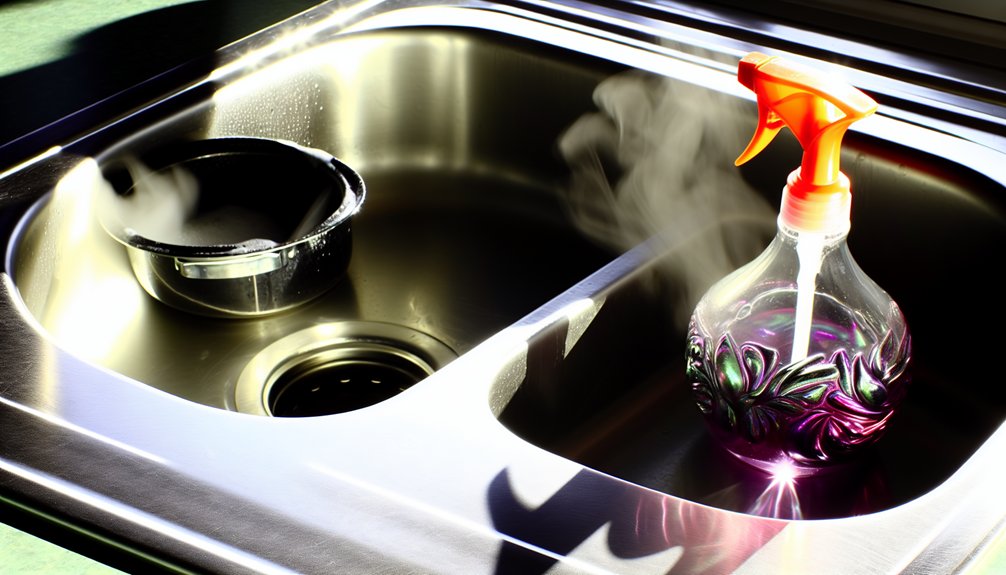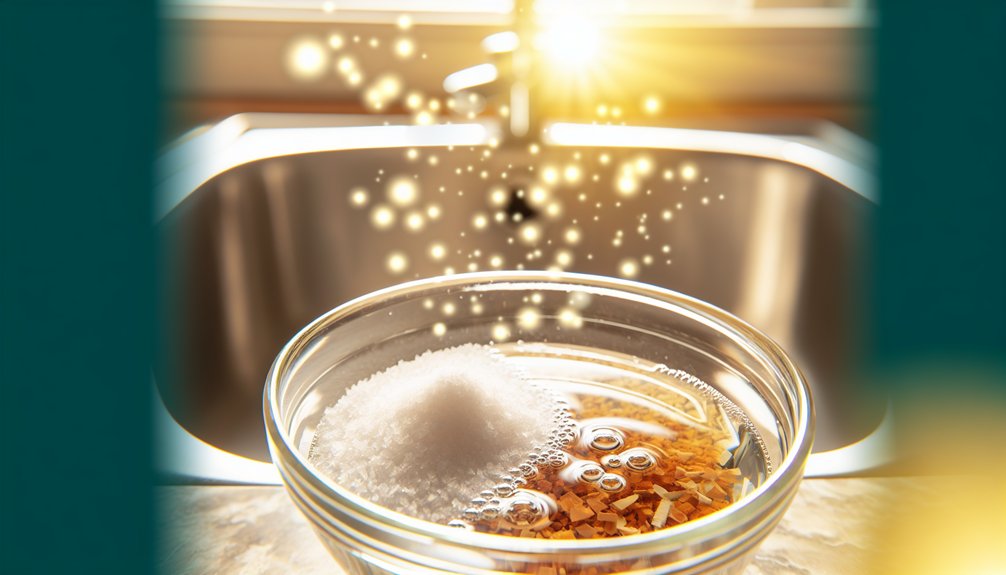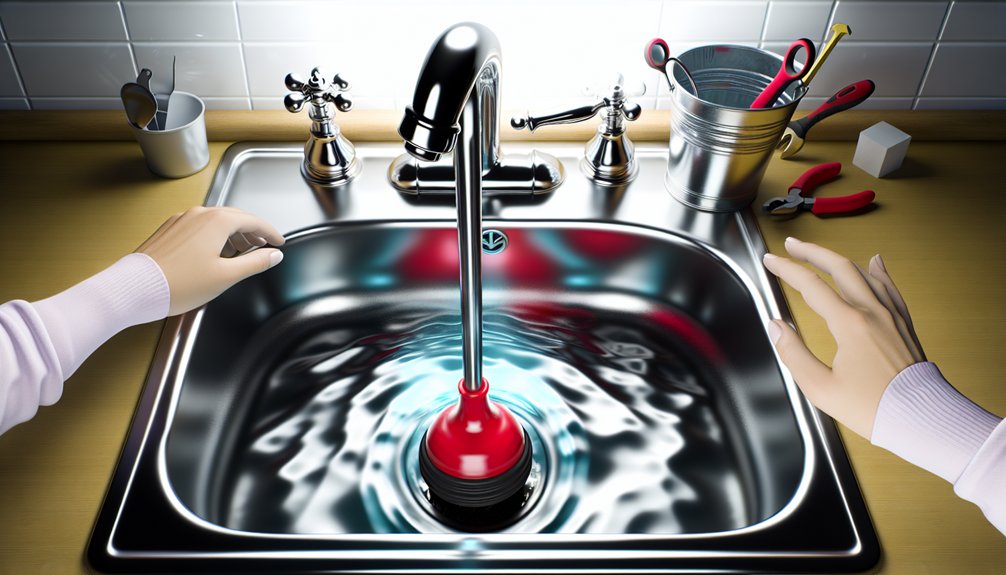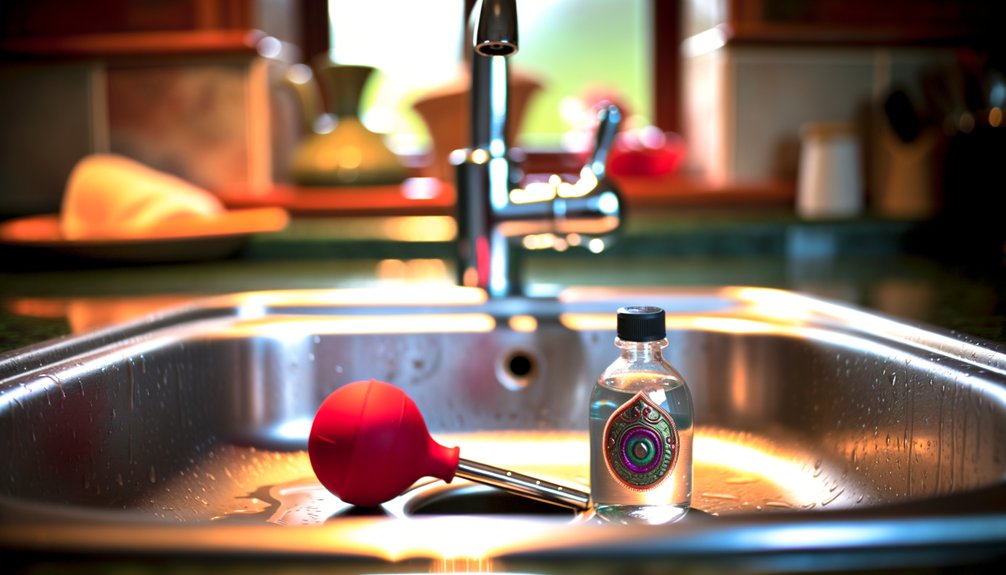For clogged sinks, several easy solutions exist. Boiling water mixed with dish soap can help dissolve grease. Baking soda and vinegar create a natural reaction that loosens minor clogs. A combination of salt, Borax, and vinegar serves to tackle more stubborn blockages. A wire coat hanger can be shaped to dislodge debris. Finally, using a plunger effectively removes clogs. Each method offers practical steps to restore drainage, and further techniques await exploration.
Boiling Water and Dish Soap

To effectively address a clogged sink, one practical solution involves the use of boiling water combined with dish soap. This method is particularly effective for clogs caused by grease and soap scum, as the high temperature of boiling water helps to liquefy and break down these stubborn substances. To implement this technique, approximately two liters of water should be boiled, followed by mixing in a few tablespoons of liquid dish soap. The mixture is then slowly poured down the sink, allowing it to penetrate deep into the clog. The dish soap emulsifies the grease, while the boiling water flushes it away. For particularly stubborn clogs, multiple applications may be necessary to achieve a clean drain. This approach is not only safe for most plumbing systems but also serves as a cost-effective alternative to commercial drain cleaners, providing a practical solution for those seeking liberation from persistent clogs.
Baking Soda and Vinegar
Utilizing a combination of baking soda and vinegar serves as an effective method for tackling minor clogs in sinks. This natural drain cleaning technique involves mixing a cup of baking soda with a cup of vinegar, creating a fizzy reaction that helps dislodge debris like hair and grime lodged in a clogged drain. To implement this solution, one should first pour the baking soda down the drain, followed by the vinegar. It is essential to plug the drain to contain the reaction, allowing it to work for about an hour. The bubbling action generates carbon dioxide, which aids in loosening clogs. After the waiting period, flushing the drain with hot water optimizes results, ensuring a clearer passage. Regular use of this method not only helps clean drains but also prevents future build-up, leading to fewer clogs and a more efficient plumbing system.
Salt, Borax, and Vinegar

A potent solution for unclogging sinks involves the effective combination of salt, Borax, and vinegar. This mixture utilizes the abrasive properties of salt and the cleaning action of Borax to tackle stubborn clogs. When combined with vinegar, a chemical reaction occurs, producing carbon dioxide that helps dislodge debris within the drain.
| Ingredient | Amount | Purpose |
|---|---|---|
| Salt | 1/4 cup | Natural abrasive |
| Borax | 1/4 cup | Odor neutralization |
| Vinegar | 1/2 cup | Reactive agent for cleaning |
To use, pour the mixture down the drain and allow it to sit for at least one hour. This enhances effectiveness before flushing with boiling water to clear remaining residue. This eco-friendly method serves as an effective alternative to chemical drain cleaners for maintaining kitchen and bathroom sinks.
Wire Coat Hanger
A wire coat hanger serves as an effective tool for unclogging sinks when transformed into a makeshift drain cleaning device. To begin, one must remove the sink stopper by releasing the pivot rod from the clevis strap, allowing better access to the drain. The wire coat hanger should be straightened while retaining a hook shape at one end, enabling it to catch excess hair and debris. Carefully maneuver the hooked end down the drain to remove blockages, such as hair or food particles. After successfully unclogging your drain, it is advisable to flush the drain with hot water to clear away residual debris and guarantee smooth drainage. Always wear rubber gloves during this process to maintain hygiene and protect hands from sharp objects that may be present. This practical approach provides a liberating solution to common sink clogs, restoring functionality with minimal effort.
Plunger Techniques

Effective plunger techniques can quickly resolve sink clogs when executed correctly. First, ascertain that the sink contains standing water sufficient to cover the plunger's flat rubber bell, which is essential for creating a proper seal. Before plunging, remove any visible debris from the sink, as this can obstruct the effectiveness of the plunger. Position the plunger firmly over the drain and plunge vigorously up and down for approximately 15-20 seconds, maintaining the seal to dislodge the clog. If the blockage persists, adding a small amount of dish soap can help lubricate the drain, facilitating better movement. For best results, utilize a cup plunger, as its design creates a better seal than a flange plunger typically used for toilets. By following these techniques, individuals can liberate their sinks from stubborn clogs efficiently and effectively.
Frequently Asked Questions
How Do You Unclog a Sink Quickly?
As water stubbornly stagnates, a sense of urgency arises. To swiftly unclog a sink, one can implement effective plumbing tips such as boiling water in stages to dissolve obstructions. Household remedies like a baking soda and vinegar reaction can provide quick fixes for minor blockages. Employing DIY solutions, like a wet and dry vacuum or a hooked wire hanger, can enhance drain cleaning. Ultimately, regular sink maintenance and prevention methods guarantee peak water flow and minimize future issues.
How Do You Unblock a Badly Blocked Sink?
To unblock a badly blocked sink, one might employ various plumbing tools and techniques. Starting with a vinegar solution and baking soda can help dissolve greasy buildup. Following this, hot water can be poured down the drain to further assist in breaking down blockages. A plunger technique may also be effective, along with a drain snake for deeper clogs. For stubborn issues, conducting a thorough pipe inspection guarantees all obstructions are addressed properly.
What Dissolves a Blocked Sink?
Approximately 80% of household clogs arise from grease buildup in sink traps. Various drain cleaning methods exist to dissolve these blockages. A vinegar baking soda reaction can effectively tackle minor clogs, while enzyme cleaners offer a gentler alternative. Chemical drainers provide a quick fix for stubborn blockages. For severe cases, hot water treatment or a plumbing snake may be necessary. Regular preventive maintenance can greatly reduce the occurrence of these issues.
What Is the Best Home Remedy for a Clogged Sink?
When seeking the best home remedy for a clogged sink, various methods can be employed. The baking soda and vinegar mixture is popular, as is the salt solution combined with hot water. For grease clogs, boiling vinegar can be effective. Dish soap mixed with hot water may help dissolve blockages. An enzyme cleaner can also break down organic materials. For persistent clogs, a plumbing snake or soda paste may be necessary for effective removal.


